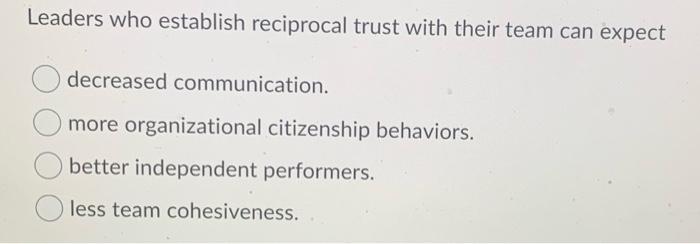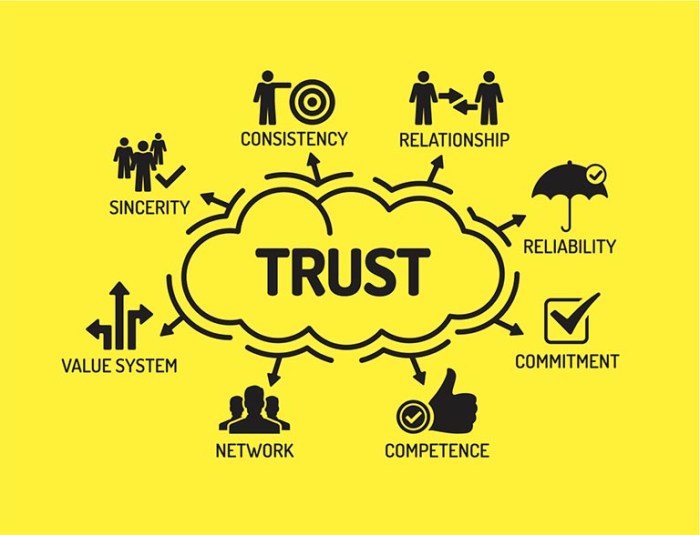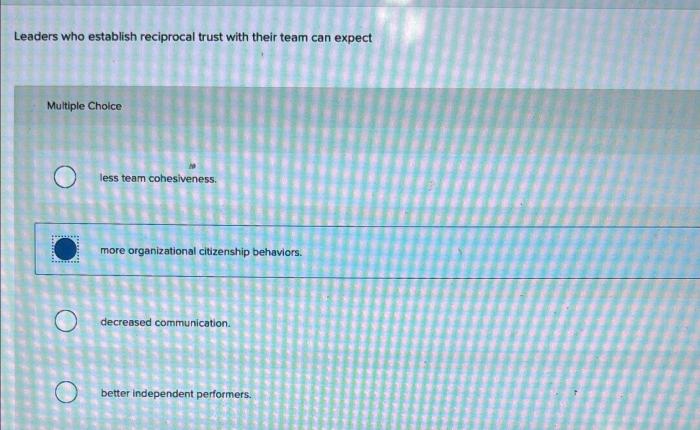Leaders who establish reciprocal trust with their team can expect a myriad of benefits, including enhanced team performance, improved outcomes, and a more positive and productive work environment. This trust-building process involves fostering mutual respect, open communication, and a shared sense of purpose.
By creating a foundation of trust, leaders empower their teams to take risks, collaborate effectively, and achieve remarkable results. This article delves into the concept of reciprocal trust, its advantages, and practical strategies for building and maintaining it within a team.
Establishing Reciprocal Trust

Reciprocal trust in leadership is a mutually beneficial relationship where both the leader and team members trust each other. Leaders who establish reciprocal trust create a positive work environment where team members feel valued, respected, and empowered. This trust is based on open communication, honesty, and a shared understanding of goals and expectations.
Examples of leaders who have successfully established reciprocal trust with their teams include:
- Satya Nadella, CEO of Microsoft, is known for his open and collaborative leadership style. He has built a culture of trust and respect at Microsoft, where employees feel comfortable sharing their ideas and taking risks.
- Indra Nooyi, former CEO of PepsiCo, is another example of a leader who established reciprocal trust with her team. She was known for her strong work ethic and her commitment to her employees. She created a culture of trust and accountability at PepsiCo, where employees were empowered to make decisions and take ownership of their work.
Benefits of Reciprocal Trust: Leaders Who Establish Reciprocal Trust With Their Team Can Expect
There are many benefits to establishing reciprocal trust with a team. These benefits include:
- Improved team performance. Teams that trust each other are more likely to collaborate effectively and achieve their goals.
- Increased innovation. Teams that trust each other are more likely to take risks and try new things.
- Reduced stress. Teams that trust each other are less likely to experience stress and conflict.
- Increased job satisfaction. Employees who trust their leaders and team members are more likely to be satisfied with their jobs.
Building Reciprocal Trust
There are a number of strategies that leaders can use to build reciprocal trust with their teams. These strategies include:
- Be open and honest. Leaders who are open and honest with their teams are more likely to build trust. This means being transparent about your decisions, admitting your mistakes, and being willing to listen to feedback.
- Keep your promises. When you make a promise to your team, keep it. This shows that you are reliable and trustworthy.
- Be fair and consistent. Treat all team members fairly and consistently. This shows that you value each member of the team and that you are not playing favorites.
- Empower your team. Give your team members the authority to make decisions and take ownership of their work. This shows that you trust them and that you believe in their abilities.
- Celebrate successes. When the team achieves a success, take the time to celebrate it. This shows that you appreciate their hard work and that you are proud of their accomplishments.
Maintaining Reciprocal Trust

Maintaining reciprocal trust over time is important. There are a number of challenges that can arise, such as:
- Misunderstandings. Misunderstandings can occur when communication is not clear or when expectations are not aligned.
- Broken promises. If a leader breaks a promise, it can damage trust.
- Unfair treatment. If a leader treats team members unfairly, it can damage trust.
- Lack of empowerment. If a leader does not empower team members, it can damage trust.
- Lack of recognition. If a leader does not recognize team members for their accomplishments, it can damage trust.
To overcome these challenges and maintain reciprocal trust, leaders should:
- Communicate clearly and often. Make sure that your team members understand your decisions and expectations.
- Keep your promises. If you make a promise, keep it.
- Treat all team members fairly and consistently. Show that you value each member of the team and that you are not playing favorites.
- Empower your team. Give your team members the authority to make decisions and take ownership of their work.
- Celebrate successes. When the team achieves a success, take the time to celebrate it.
Impact of Reciprocal Trust on Team Culture
Reciprocal trust has a positive impact on team culture. Teams that trust each other are more likely to be:
- Collaborative. Team members are more likely to work together and share ideas.
- Innovative. Team members are more likely to take risks and try new things.
- Productive. Team members are more likely to be productive and achieve their goals.
- Positive. Team members are more likely to have a positive attitude and enjoy working together.
Reciprocal trust is essential for creating a positive and productive team culture. When team members trust each other, they are more likely to be successful.
Case Studies of Reciprocal Trust

There are many case studies of leaders who have successfully established reciprocal trust with their teams. One example is the case of Admiral James Stockdale, who led a group of American prisoners of war during the Vietnam War. Stockdale and his fellow prisoners were subjected to torture and other forms of abuse.
Despite these hardships, Stockdale was able to maintain a positive attitude and inspire his fellow prisoners. He did this by building trust and rapport with his team members. He was always honest with them, even when the news was bad.
He also made sure to keep his promises and treat all of his team members fairly.
Another example of reciprocal trust is the case of Herb Kelleher, the co-founder of Southwest Airlines. Kelleher was known for his open and collaborative leadership style. He empowered his employees to make decisions and take ownership of their work. He also celebrated successes and treated all of his employees fairly.
As a result, Southwest Airlines has a strong culture of trust and respect, and its employees are known for their high levels of productivity and customer service.
FAQ Explained
What is reciprocal trust in leadership?
Reciprocal trust in leadership is a dynamic relationship where trust flows both ways between leaders and their teams. It involves mutual respect, open communication, and a shared sense of purpose.
How does reciprocal trust benefit teams?
Reciprocal trust fosters collaboration, risk-taking, and innovation within teams. It creates a positive and productive work environment, leading to improved team performance and outcomes.
What are strategies for building reciprocal trust?
Strategies for building reciprocal trust include setting clear expectations, providing regular feedback, recognizing and rewarding contributions, and actively listening to team members’ perspectives.